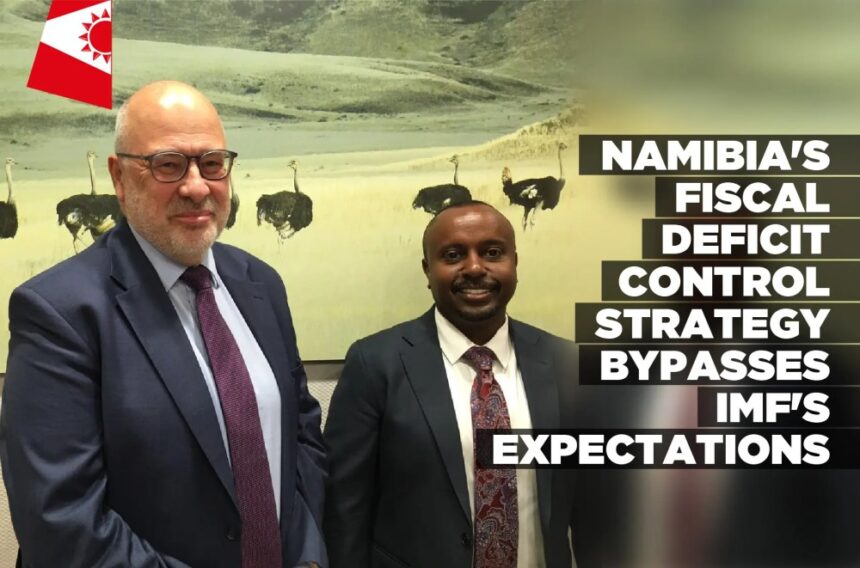Fund says Namibia amongst few country that do not require loans from IMF
Business Reporter
THE International Monetary Fund has said that Namibiq’s fiscal deficit has narrowed considerably, from 8.6% in 2021/22 to 5.3% in 2022/23, as pandemic-related spending pressures eased, and measures were taken to contain the public wage bill growth and improve the performance of state-owned enterprises.
The fiscal deficit relates to governements total expenditure in relation to its total revenue, excluding borrowing.
This was shared by an International Monetary Fund (IMF) staff team, led by Jaroslaw Wieczorek, IMF mission chief for Namibia, who visited Windhoek during September 18 ‒ October 2, 2023, to conduct discussions for the 2023 Article IV Consultation with Namibia.
Albeit the shrinking of the fiscal deficit over the years, the IMF said that public debt continued to rise and reached 68.7% of GDP with the associated interest costs attaining 4.5% of GDP. Meanwhile, social assistance was expanded to address food insecurity.
At the conclusion of the mission, Wieczorek made the following statement.
“On the back of sustained mining growth and recovery in tourism, real GDP growth reached 4.6% in 2022 and economic activity is expected to surpass the pre-pandemic level in 2023 with a growth of 3.2%. Nevertheless, unemployment remains elevated at 21% and is particularly acute among the youth. For 2024 and the medium-term, growth path is expected to stabilize at just below 3%.”.
The IMF mission chief further said that going forward, implementing the authorities’ fiscal consolidation strategy is pivotal to preserve debt sustainability and protect against the volatility of SACU revenues, which represent a significant contribution to the budget.
To this end, Wieczorek said that it is vital to accelerate public wage reform—including introducing early retirement—and the reform of state-owned enterprises.
“To respond to inflationary pressures, the Bank of Namibia has tightened its policy stance following the South African Reserve Bank (SARB). Keeping the policy rate aligned with the SARB and maintaining an adequate level of reserves will support the currency peg and anchor inflation. Enhanced macroprudential oversight will help strengthen the resilience of the financial sector and support financial stability.,” Wieczorek said.
Touching on Namibia’s weaknesses and strengths, Wieczorek said Namibia deserves praise in terms of micro-economic management. “It has a sustainable level of public debt. It was high, but we assessed the risk, and it is moderate. Namibia has been drawing on its considerable domestic savings which include financial systems such as banks and non-banking financial institutions. Foreign currency stands around 15%. The external exposure of Namibia’s debt is very weak. It gives authorities room to manoeuvre. Namibia’s other strength is that it has a high domestic revenue to GDP Ratio. Taken up together with SACU revenue it exceeds 30% of GDP, and without SACU revenue it is over 20%,” Wieczorek said.
Commenting on the country’s weaknesses Wieczorek said that government wage bill as well as servicing interest rates on public debt take up around 55% of government expenditure. This he said, leaves little room to spent on social interventions, such as upgrading education infrastructure and training. “Vocational training is also lacking to address the skills mismatch. The private sector is reporting that they have vacancies they cannot fill due to a lack of skills,” Wieczorek said.
He concluded that in the bigger scheme of things, the mineral wealth creates a source of comfort for Namibia, as it creates revenue however it does not employ enough people, and creates a problem. “This is the big structural challenge the economy faces, but there is no quick fix, it will take years of resolute policies to help create this capacity. The role of the government is to enable the environment in which these jobs can be created.
Namibia is amongst the very fortunate countries that do not need to come to the IMF for loans.
Namibia in it’s totality is not a poor country. The country as a whole is considered an upper-middle country. we do not come to upper-middle countries alot, we assist countrys’ governments who need assistance with their balance of payments. Namibia could reach out on the basis of its strength to institutions such as the KFW and AFDB which do project financing,” Wieczorek said.
IMF: Left, IMF mission chief, Jaroslaw Wieczorek and one of his staff members, Daniel Gurara.



Leave a Reply